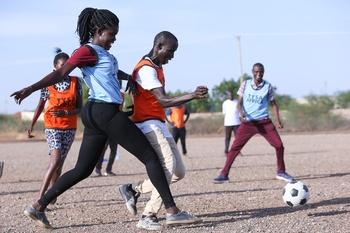Context
Women and girls are still disadvantaged and discriminated against in almost all areas of social, economic, and political life. As a consequence of COVID-19, girls and women have been increasingly prevented from accessing education and employment opportunities and are suffering from an increase in gender-based violence. The main reasons for the persisting inequalities are cultural, legal, and economic barriers that are often deeply rooted in societal norms, patriarchal power structures and individual interests.
Objective
Sports-based approaches promote gender equality, the transformation of stereotypical gender roles, and social and job-relevant skills on the pan-African, national, and regional levels.


